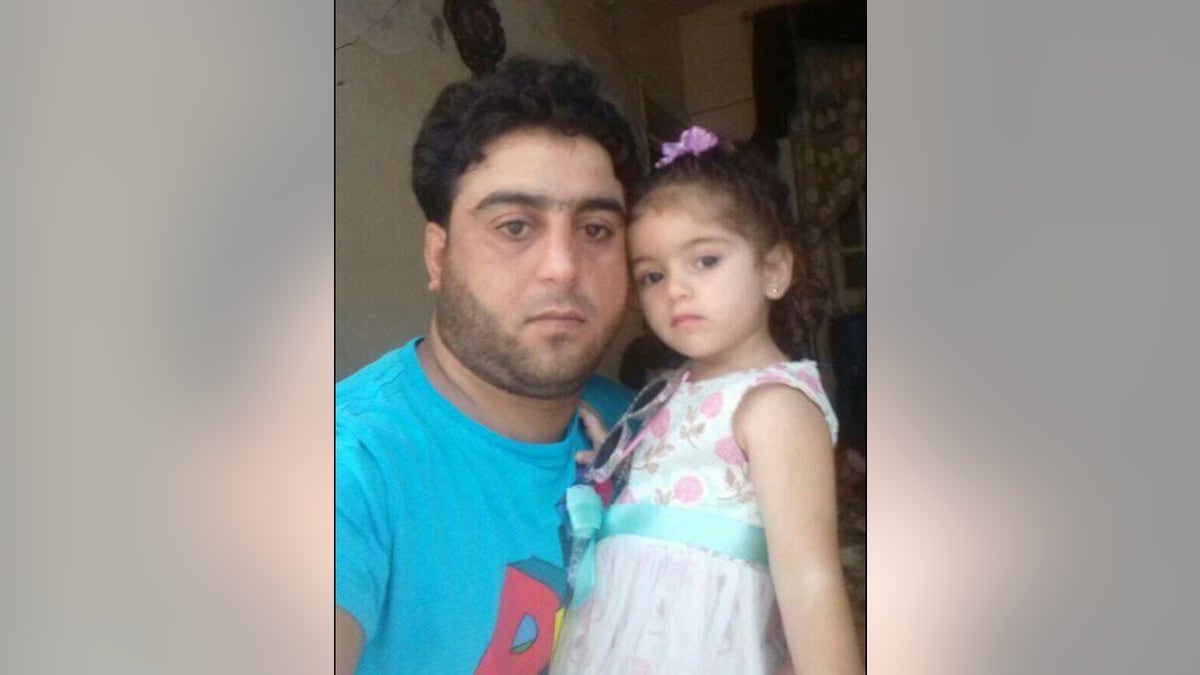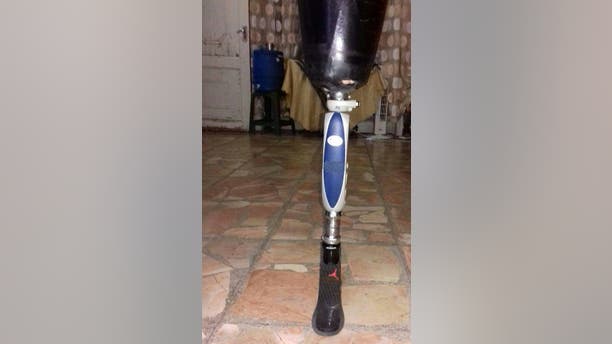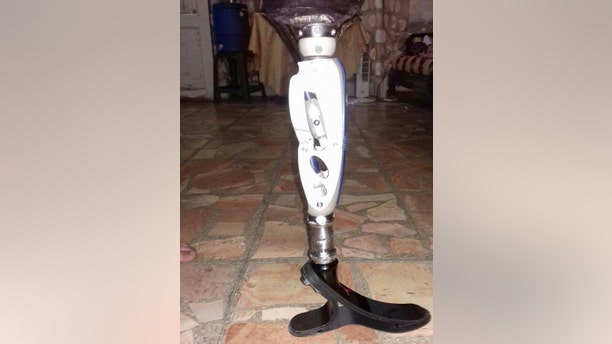
Ghazwan, a Syrian amputee in the rebel-held stronghold of Idlib, pictured with his daughter. He is trying to sell his prosthetic foot to pay back loans and support his family.
In Idlib province in northwestern Syria, deemed the last government stronghold in the conflict-butchered country, civilians caught in the crossfire of escalating poverty and hopelessness have resorted to selling whatever they can to survive – including body parts.
“I need money, I borrowed money from people to get a fake foot and they need their money back,” Ghazwan, a married 31-year-old father of two young daughters, told Fox News. “Therefore, I want to sell my foot.”
Two years ago, he was caught in an aerial bombardment attack by Syrian regime planes and his leg was amputated below the knee. For the surgery, along with the seven following operations, medicines, and a prosthetic limb, Ghazwan borrowed money from friends and family eager to help. But with the deteriorating humanitarian crisis and lack of jobs, nearly everyone needs money.
His eyes glazed with tears, Ghazwan remembered for a moment life before the war. He worked on a ship as a chef. Now, he said, all he feels is sadness and depression.
“I feel that I am alone,” Ghazwan noted. He said he is trying to pick up jobs here and there – and his wife and children are also trying to find work – but his limb is the only thing of value left to sell, and he doesn't want to leave. He doesn't want to become a refugee.
“Please tell the world to stop the war in Syria and don’t forget us disabled people and poor people,” Ghazwan stressed. “Please stop acting as animals and killing each other.”
Ghazwan has been posting advertisements on social media and asking around the neighborhood over the past couple of weeks in the hopes of finding a potential buyer able to meet the needs of his $6,000 price tag. But so far, despite the many missing limbs six-and-a-half years into the war, he hasn’t had any luck.
INSIDE IRAN: WESTERN TOURISM A GROWING GOVERNMENT MONEY-MAKER
Yet Ghazwan is hardly alone in his grim quest. The selling of body parts has become something of an accepted practice both in the war zone and among Syrian refugees. The trade of illegal organs in neighboring countries – especially Lebanon – has burgeoned over the past couple of years, with desperate refugees exploited by surgeons and sellers willing to make a quick buck to feed their family and survive.
“There are people who sell one of their kidneys so they can run away from this country and try to live a better life with their children,” said Idlib-based human rights activist, Suhaib Monzer Zakour. “Many people sell everything they possibly can to reach a safer place. Some of them have got absolutely no money left to rent a room, so they have to try and find a tent for displaced people on the border.”
Idlib’s population has ballooned from its pre-war estimate of fewer than 1.5 million to more than 2 million – particularly as other former rebel holds such as Aleppo and Homs fell to government forces. The rise has subsequently deepened the poverty, chaos and displacement – at least half have no home – inside the already bomb-battled governorate.
The city also continues to be overrun by Al Qaeda-linked jihadists, as the extremist faction Hayat Tahir al Sham has seized control of most the city over the past few months and has set up its own harsh interpretations of Islamic law. Its escalating dominance could see the U.S. dragged further into the quagmire of the long-running civil war, given the threat that Al Qaeda poses to the homeland.
AS U.S. CLOSE TO VICTORY VS. ISIS IN SYRIA, AL QAEDA TAKES TERRITORIAL CONTROL
Despite the militant grip, many inside Idlib describe it as akin to anarchy – each to his or her own, a freefall of sorts to survive, with few employment and education prospects and an alarming lack of goods and services.
However, civilians may at least have some temporary reprieve from bombs falling and bullets flying. Syria and its allies Russia and Iran, along with Turkey – which opposes the Syrian regime – agreed on Friday to establish de-escalation zones for at least six months in Idlib, as well as parts of Latakia, Aleppo and Hama provinces.
Ankara’s presidential spokesperson Ibrahim Kalin expressed confidence that the deal would allow for humanitarian aid to be delivered inside the province despite Al Qaeda’s control. Last month, Turkey stated that it was restricting the flow of non-humanitarian aid into Idlib given the dominance of a “terrorist organization.”
SYRIA’S SECRET CAVES SERVE AS HOSPITALS IN A FINAL LIFELINE TO SAVE VICTIMS
Activists confirmed to Fox News that around 18 Turkish army vehicles arrived to the Rihaniyah area on the Turkish-Syrian border early Sunday, where they're expected to move deeper into Syrian territory. The agreement, while embraced by some, also has many civilians worrying that fighting could break out at any moment between Turkish and Syrian soldiers.
Since March 2011, the Syrian war has killed up to half a million people and displaced more than 10 million. It has been deemed the worst humanitarian crisis since World War II.
























